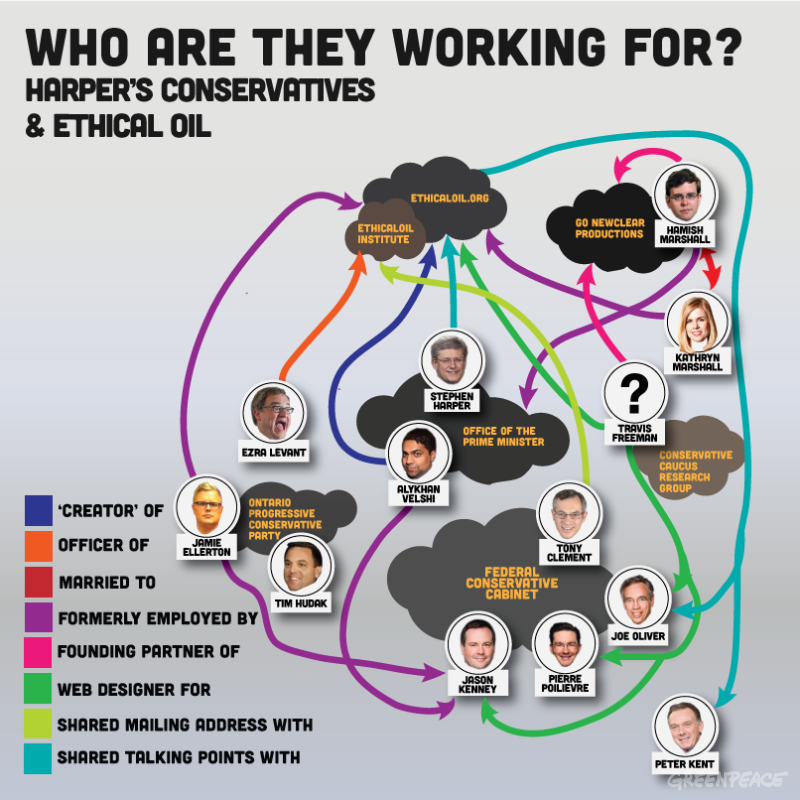When Greenpeace Canada’s climate and energy campaigner Keith Stewart filed an official complaint with Elections Canada, he did a lot more than question the implications of the Ethical Oil Institute’s collusion with the Conservative Party of Canada: he called national attention to the corrosive effect oil money has had on Canadian politics in recent years.
“At the broadest level,” Stewart told DeSmog Canada via e-mail, “we are trying to rebalance the playing field between money and people power in Canadian politics. You can never eliminate the influence of money on politics, but you can limit it and make it more transparent.”
Greenpeace’s request for an investigation is based on the fact that corporate donations to political parties are banned in federal politics — yet money raised by the Ethical Oil Institute appears to have been spent on advertising and other activities developed and implemented by people directly involved in the Conservative Party of Canada. The institute does not disclose its funding sources, but its website states it does “accept donations from Canadian individuals and companies, including those working to produce Ethical Oil.”
Stewart’s request outlines the revolving-door relationships driving pro-oilsands communications strategies from Fort McMurray to Ottawa and how deeply those relations are embedded in the political soil. The institute was founded in July 2011 by Alykhan Velshi, who left Jason Kenney’s political staff to create Ethical Oil. He returned within a few months to a senior position in the Prime Minister’s Office.
A Greenpeace map of the overlapping relations between Ethical Oil and the Conservative government. Click to enlarge.
Ultimately, the request to investigate the Ethical Oil Institute’s use of contributions to carry out a Conservative agenda has to do with uprooting the pernicious influence of oil on Canadian democracy.
“We are trying to prevent the oil patch from pouring money into an Ethical Oil-led, pro-Conservative ad campaign in advance of the 2015 federal election,” Stewart said.
According to Stewart, Ethical Oil “is trying to import a U.S. model of establishing fake grassroots groups” to lend cultural legitimacy to an “elite agenda.” In this case, he said the campaign is designed to make the protection of oil interests — in the face of a warming world — seem “somehow in the interest of the average citizen.”
“It’s dishonest and destructive,” he said.
Ethical Oil responded to the complaint by claiming “EthicalOil.org does not give any money to any political party, nor has Ethical Oil campaigned in any election,” even though Greenpeace’s charge is leveled at the Ethical Oil Institute, not against the website EthicalOil.org — which is just one aspect of the institute’s work.
The Ethical Oil Institute is behind arguments such as Canada’s oil being like fair-trade coffee and foreign-funded interests lurking behind Canada’s environmental movement. The accusations have been instrumental in the ongoing audits of Canada’s most prominent environmental charities, many of whom were targeted in Ethical Oil attacks.
“Ethical Oil is trying to hide the corrosive effect of oil on our politics by telling Canadians that the poor little oil companies are being picked on by big mean environmentalists,” Stewart said.
Yet, as Stewart lays out in his letter to Elections Canada, the work of the Ethical Oil Institute has been in lockstep with the Conservative party to influence public opinion on oil development and mischaracterize environmental groups.
“Their attack on environmental charities is a blatant attempt to silence those who are critical of the Harper government agenda on oil and the environment and to block a national conversation on what kind of an energy future we want,” he said.
Ultimately, Stewart said, Canada needs to start taking climate science seriously, a move impaired by the work of groups like Ethical Oil.
“I’d like to see the government take the latest reports from the IPCC and boil them down to what this means for Canada in terms of possible impacts and what opportunities are there for us on an energy pathway that is consistent with avoiding the worst impacts of climate change,” Stewart said.
“We could then take these on the road and have the kind of community-led discussions that have happened before on the issue of national unity, which could help build consensus on what we need to do.”
Image Credit: Greenpeace Canada
Subscribe to our newsletter
Stay up to date with DeSmog news and alerts








